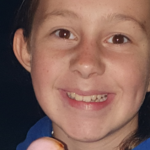The UK’s leading children’s charity is warning of the dangers of encrypted messaging services, and says if not managed, abusers and groomers will thrive.
End-to-end encryption allows every conversation to be private. It is impossible for anyone except the sender and recipient to read them.
In what it is calling the “biggest threat to children online”, the NSPCC (National Society for the Prevention of Cruelty to Children) says safeguards need to be introduced so police can access the data if needed.
“The proposals to extend end-to-end encryption on messaging platforms mean they are essentially putting a blindfold on itself” says Andy Burrows, head of the NSPCC’s child safety online policy.
“No longer will the social network be able to identify child abuse images that are being shared on its site, or grooming that’s taking place on its site.
“Because abusers know they will be able to operate with impunity, therefore it means that not only will current levels of abuse go largely undetected, but it’s highly likely that we’ll see more child abuse.”
Online child sexual abuse and grooming have steadily increased, with the first UK national lockdown serving as a catalyst for a significant rise.
The charity’s research has found that in the past year, Facebook‘s platforms were used in more than half of all online child sex crime.
Between October 2019 and September 2020, police recorded more than 9,400 instances when online communication was being used to commit sexual or indecent image offences against under-18s.
Fifty-two per cent of these took place on Facebook-owned apps.
The figures reveal how Instagram is increasingly being exploited by offenders, with Instagram accounting for a third of all incidents.
The charity fears many of these could go unreported if end-to-end encryption is expanded across more platforms without loopholes.
Subscribe to the Daily podcast on Apple Podcasts, Google Podcasts, Spotify, Spreaker
Frida, not her real name, was groomed online from the age of 13, by a stranger in his 30s.
Their messages became increasingly dangerous.
Speaking to Sky News, Frida describes how conversations became darker.
“He was asking for explicit content from me and we were having more explicit conversations,” she says.
“And at that point he wanted to transition to WhatsApp because Facebook felt like a much more public platform – even though we were private messaging.
“I started sending him explicit photos on there because that was what he wanted.
“It felt more intense and intimate there, and I was less worried about the things I was sending him getting elsewhere.”
The NSPCC says it wants the government’s upcoming Online Safety Bill to compel firms to consider child protections when they design their sites to prevent harm at the earliest stage, rather than for Ofcom to react once the damage is done.
Facebook has not responded to Sky News’s request for comment.
A government spokesperson said: “Our Online Safety Bill will bring in world-leading measures to protect children and ensure there is no safe space for paedophiles to hide on social media.
“The burden will fall solely on social media companies to prove they’re doing all they can to keep children safe and they will not be able to use encryption as an excuse.
“End-to-end encryption risks blinding both social media companies and law enforcement to these dreadful crimes and tech companies must put public safety at the heart of their system designs or face heavy fines.”
The draft bill is expected in the spring.






















